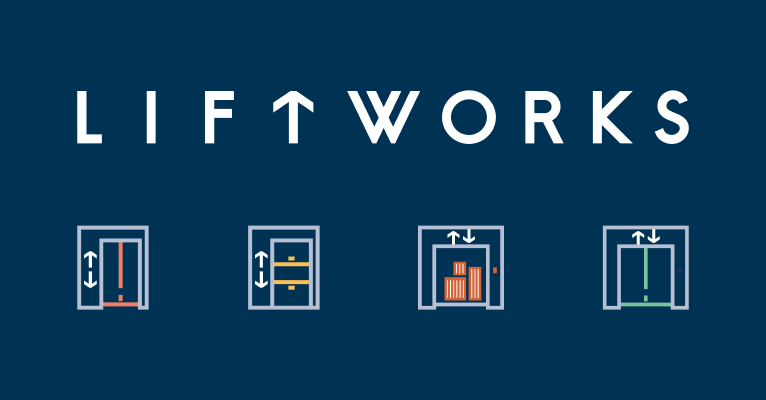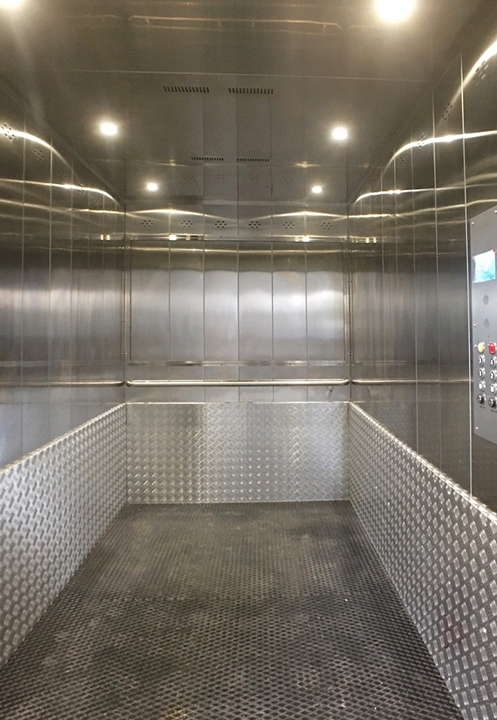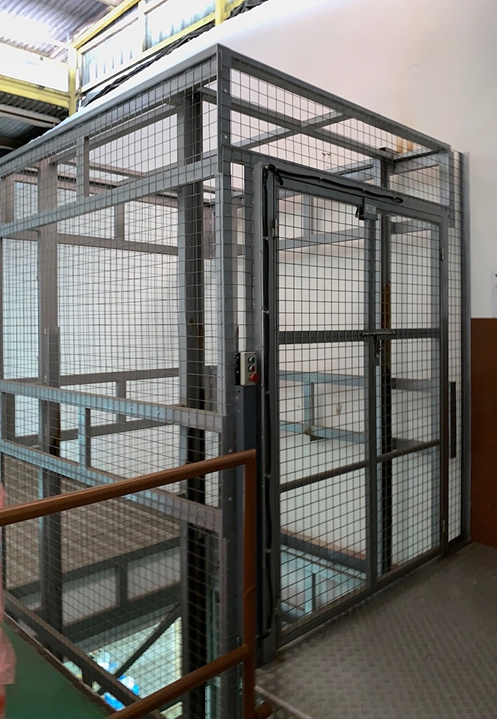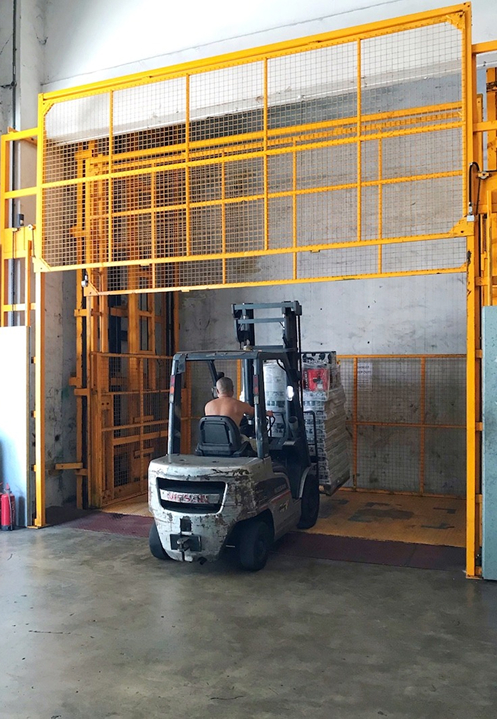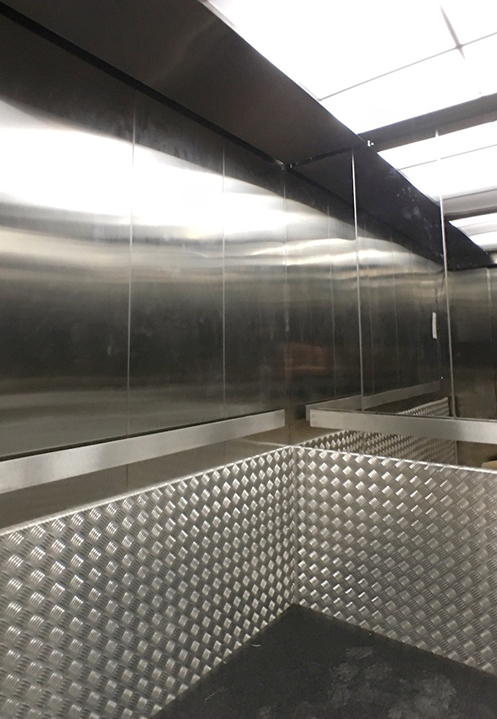Cargo Lift & Material Hoist
Efficient and safe vertical transportation for goods, materials, and equipment in industrial and commercial settings.
Heavy-Duty Vertical Transport for Large Loads

Detailed Description
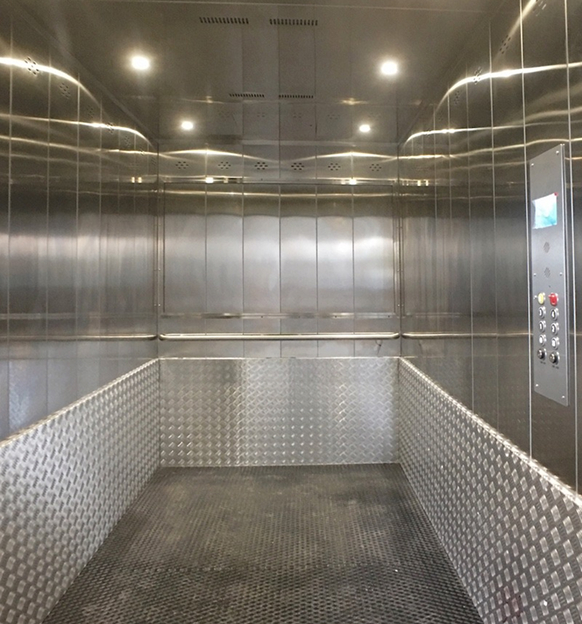
The Cargo Lift & Material Hoist is designed for industrial and commercial environments where the efficient movement of heavy goods is required. Built to handle large loads ranging from 1,500 kg and beyond, these lifts are the perfect solution for warehouses, factories, construction sites, and other high-demand locations.
Unlike typical passenger elevators, cargo lifts offer greater capacity and rugged durability, ensuring smooth and safe transport of goods and materials between floors or from ground level to upper levels. With a variety of load capacities, platform sizes, and customizable designs, our cargo lifts can be tailored to suit the specific needs of your business, improving workflow and reducing manual labor.
Our material hoists are particularly beneficial for construction sites where heavy materials (like cement, tools, or building supplies) need to be moved swiftly and safely. They are designed to operate in the most demanding conditions, offering reliable performance even in harsh environments.
Key Features
Heavy-duty performance
Durable construction
Customisable platform sizes and load capacities
Fast and reliable vertical transport
Safety features including emergency stop, overload protection, and safety gates
Energy-efficient motor systems for cost-effective operation
Easy installation and low maintenance
Compliant with international safety standards (BCA, CE, ISO)
Our
Frequently Asked Questions

1. What types of lifts do you supply and install?
At Lift Works, we specialize in providing and installing a wide range of lifts for residential, commercial, and industrial applications. Our products include:
Home lifts (Traction, Hydraulic)
Cargo lifts
Dumbwaiters
Material hoists
With over 40 years of experience, we have developed expertise in offering tailored lift solutions for various needs.
2. Do all lifts operate on the same mechanism?
No, different lifts use different systems, depending on the needs of the space and installation requirements. The two most common systems are:
Gearless Traction System: Known for its energy efficiency, smoothness, and faster ride, this system is ideal for new constructions with adequate space for installation.
Hydraulic System: A more flexible option, suitable for retrofit projects with smaller space requirements. While it offers a slower ride, it’s a cost-effective solution for homes and commercial buildings.
3. How do I decide which lift is best for my home, office, or building?
4. What's the difference between cargo lifts and material hoists?
The main difference is the cargo lift is designed to carry both goods and passengers, while a material hoist is strictly for transporting goods only.
5. Do you offer lift maintenance and servicing?
6. Do you offer lift modernization services?
Yes, we offer modernization services for existing lifts to meet the latest BCA regulations and improve their performance. Reach out to us at sales@liftworks.co
for further discussion.
1. Is my landed home suitable for a lift installation?
Yes, most landed homes can accommodate a lift. Even if your home is already built, we can often retrofit a lift. For new constructions or Addition & Alteration (A&A) projects, it’s best to plan for a lift from the start to have full flexibility with lift system choices.
Contact us at projects@liftworks.co to discuss your options or schedule a consultation.
2. What is the maximum load capacity of a home lift?
The capacity depends on the available space. The standard home lift car is typically 900 x 1200mm and can carry up to 400kg — enough to accommodate a wheelchair and an additional person.
3. How much does it cost to install a home lift?
The cost varies depending on several factors such as the lift system chosen, structural requirements, and finishes. Generally, a basic model may cost less than purchasing a car in Singapore.
4. How long does it take to install a home lift?
From confirmation, the fabrication and shipment process usually takes 2-4 months, with installation taking approximately 1 month.
5. How long will my home lift last?
A well-maintained lift can last between 15-20 years, depending on usage and maintenance.
1. What is a dumbwaiter and how does it work?
A dumbwaiter is a small elevator used for transporting goods, typically between floors. It can carry 50-300 kg loads and operates using a traction lift system with pulleys and counterweights.
2. What is the weight limit for a dumbwaiter?
Dumbwaiters can handle loads from 50 kg to 300 kg, depending on the model. For larger items, a 1.2m x 1.2m dumbwaiter can transport up to 300 kg.
3. Why should I install a dumbwaiter in my commercial building?
Dumbwaiters help transport goods efficiently between floors, reducing manual labor and improving safety. They’re ideal for restaurants, hospitals, schools, and businesses with multiple floors.
4. Can a dumbwaiter be installed in a landed home?
Yes, a dumbwaiter is useful for moving heavy items between levels, whether it’s for home or commercial use.
5. Does a dumbwaiter require government approval for installation?
Yes, a dumbwaiter needs approval from the Building and Construction Authority (BCA). We handle the approval process for you, ensuring a smooth installation.
6. How long does it take to install a dumbwaiter?
From confirmation, fabrication and shipment can take 1-2 months, and installation typically takes around 3 weeks.
Our
Frequently Asked Questions

1. What types of lifts do you supply and install?
At Lift Works, we specialize in providing and installing a wide range of lifts for residential, commercial, and industrial applications. Our products include:
Home lifts (Traction, Hydraulic)
Cargo lifts
Dumbwaiters
Material hoists
With over 40 years of experience, we have developed expertise in offering tailored lift solutions for various needs.
2. Do all lifts operate on the same mechanism?
No, different lifts use different systems, depending on the needs of the space and installation requirements. The two most common systems are:
Gearless Traction System: Known for its energy efficiency, smoothness, and faster ride, this system is ideal for new constructions with adequate space for installation.
Hydraulic System: A more flexible option, suitable for retrofit projects with smaller space requirements. While it offers a slower ride, it’s a cost-effective solution for homes and commercial buildings.
3. How do I decide which lift is best for my home, office, or building?
To determine which lift system is most suitable, a consultation with a lift specialist is essential. Our professional engineers will assess your space, review installation requirements, and discuss your options. We can schedule an on-site consultation or a visit to our showroom to explore lift demos and design finishes.
Contact us at projects@liftworks.co or call 6464 7527. Our showroom visits are by appointment only, available weekdays and weekends.
4. What's the difference between cargo lifts and material hoists?
The main difference is the cargo lift is designed to carry both goods and passengers, while a material hoist is strictly for transporting goods only.
5. Do you offer lift maintenance and servicing?
Yes! We provide lift maintenance and servicing for lifts we have installed. If the lift was installed by another company, we’ll assess it on a case-by-case basis. Email us at projects@liftworks.co for more details.
6. Do you offer lift modernization services?
Yes, we offer modernization services for existing lifts to meet the latest BCA regulations and improve their performance. Reach out to us at projects@liftworks.co for further discussion.
1. Is my landed home suitable for a lift installation?
Yes, most landed homes can accommodate a lift. Even if your home is already built, we can often retrofit a lift. For new constructions or Addition & Alteration (A&A) projects, it’s best to plan for a lift from the start to have full flexibility with lift system choices.
Contact us at projects@liftworks.co to discuss your options or schedule a consultation.
2. What is the maximum load capacity of a home lift?
The capacity depends on the available space. The standard home lift car is typically 900 x 1200mm and can carry up to 400kg — enough to accommodate a wheelchair and an additional person.
3. How much does it cost to install a home lift?
The cost varies depending on several factors such as the lift system chosen, structural requirements, and finishes. Generally, a basic model may cost less than purchasing a car in Singapore.
4. How long does it take to install a home lift?
From confirmation, the fabrication and shipment process usually takes 2-4 months, with installation taking approximately 1 month.
5. How long will my home lift last?
A well-maintained lift can last between 15-20 years, depending on usage and maintenance.
1. What is a dumbwaiter and how does it work?
A dumbwaiter is a small elevator used for transporting goods, typically between floors. It can carry 50-300 kg loads and operates using a traction lift system with pulleys and counterweights.
2. What is the weight limit for a dumbwaiter?
Dumbwaiters can handle loads from 50 kg to 300 kg, depending on the model. For larger items, a 1.2m x 1.2m dumbwaiter can transport up to 300 kg.
3. Why should I install a dumbwaiter in my commercial building?
Dumbwaiters help transport goods efficiently between floors, reducing manual labor and improving safety. They’re ideal for restaurants, hospitals, schools, and businesses with multiple floors.
4. Can a dumbwaiter be installed in a landed home?
Yes, a dumbwaiter is useful for moving heavy items between levels, whether it’s for home or commercial use.
5. Does a dumbwaiter require government approval for installation?
Yes, a dumbwaiter needs approval from the Building and Construction Authority (BCA). We handle the approval process for you, ensuring a smooth installation.
6. How long does it take to install a dumbwaiter?
From confirmation, fabrication and shipment can take 1-2 months, and installation typically takes around 3 weeks.
